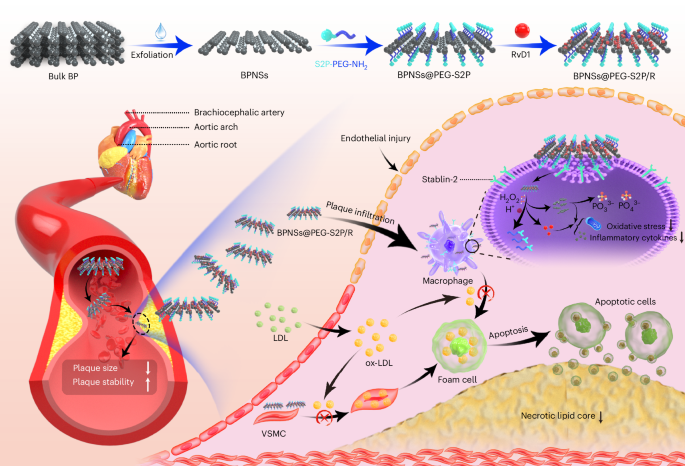Targeted-peptide nanosheets for anti-atherosclerotics delivery to lesional macrophages
Published in Bioengineering & Biotechnology, Chemistry, and Materials

The buildup of plaques in atherosclerosis leads to cardiovascular events, with chronic unresolved inflammation and overproduction of reactive oxygen species (ROS) being major drivers of plaque progression. Nanotherapeutics that can resolve inflammation and scavenge ROS have the potential to treat atherosclerosis. Here we demonstrate the potential of black phosphorus nanosheets (BPNSs) as a therapeutic agent for the treatment of atherosclerosis. BPNSs can effectively scavenge a broad spectrum of ROS and suppress atherosclerosis-associated pro-inflammatory cytokine production in lesional macrophages. We also demonstrate ROS-responsive, targeted-peptide-modified BPNS-based carriers for the delivery of resolvin D1 (an inflammation-resolving lipid mediator) to lesional macrophages, which further boosts the anti-atherosclerotic efficacy. The targeted nanotherapeutics not only reduce plaque areas but also substantially improve plaque stability in high-fat-diet-fed apolipoprotein E-deficient mice. This study presents a therapeutic strategy against atherosclerosis, and highlights the potential of BPNS-based therapeutics to treat other inflammatory diseases.
In contrast to conventional strategies involving a nanocarrier delivering drugs, we have developed an innovative ‘nanodrug-delivering-drugs’ approach for atherosclerosis treatment. Specifically, we harness the drug-carrying capability of BPNSs to load resolvin D1 (RvD1), an inflammation-resolving lipid mediator found to be deficient in vulnerable atherosclerotic plaques. Although RvD1-loaded BPNSs scavenge the surrounding ROS, the degradation of BPNSs selectively releases RvD1 in lesional macrophages, thereby boosting the anti-atherosclerotic efficacy in an apolipoprotein E-deficient (Apoe−/−) mouse model of atherosclerosis (Fig. 1). Utilizing targeted-peptide-modified and pro-inflammatory cue-responsive drug delivery nanoplatforms, this enhanced therapeutic strategy not only effectively ameliorates oxidative stress in atherosclerotic plaques but also effectively delivers pro-resolving drugs to lesional macrophages in Apoe−/− mice, highlighting its promise for the treatment of atherosclerosis and other inflammatory diseases.

Follow the Topic
-
Nature Nanotechnology

An interdisciplinary journal that publishes papers of the highest quality and significance in all areas of nanoscience and nanotechnology.






Please sign in or register for FREE
If you are a registered user on Research Communities by Springer Nature, please sign in